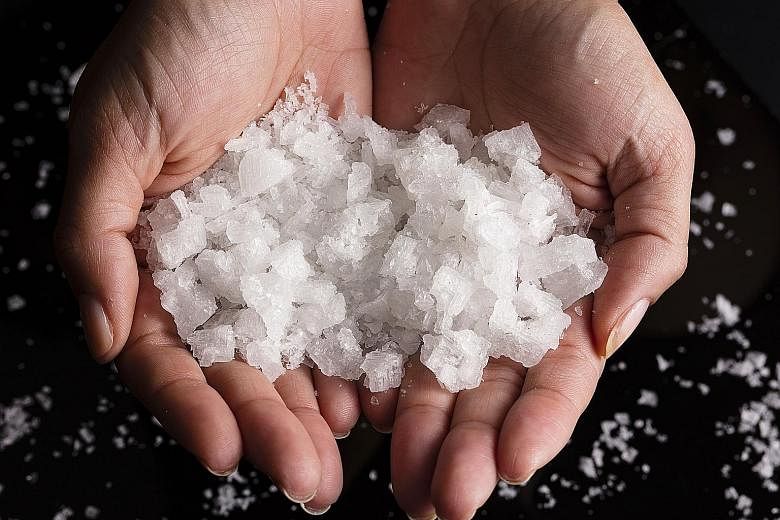NEW YORK • The theory is intuitive and simple: If you eat a lot of salt - sodium chloride - you will become thirsty and drink water, diluting your blood enough to maintain the proper concentration of sodium. Ultimately, you will excrete much of the excess salt and water in urine.
But now, a new study says the theory may be completely wrong.
Studies of Russian cosmonauts, held in simulated space travel, showed that eating more salt made them less thirsty but hungrier. Subsequent experiments found that mice burned more calories when they got more salt, eating 25 per cent more to maintain their weight.
The research, published recently in The Journal Of Clinical Investigation, contradicts the conventional wisdom about how the body handles salt and suggests that high levels may play a role in weight loss.
The findings have stunned kidney specialists but experts said the findings need to be replicated.
"This is just very novel and fascinating," said Dr Melanie Hoenig, an assistant professor of medicine at Harvard Medical School.
It has been a decades-long quest by Dr Jens Titze, now a kidney specialist at Vanderbilt University and the Interdisciplinary Centre for Clinical Research in Germany.
In 1991, as a medical student in Berlin, he studied data from a simulated 28-day space mission, noting that samples of urine showed astronauts' urine volumes went up and down in a seven-day cycle. That contradicted all he had been taught in medical school.
His further study of Russian cosmonauts found a 28-day rhythm in the amount of sodium their bodies retained that was not linked to the amount of urine they produced. And the sodium rhythms were much more pronounced than the urine patterns.
The real shocker came in the amount of sodium excreted in the crew's urine, the volume of their urine and the amount of sodium in their blood. The mysterious patterns in urine volume persisted, but everything seemed to proceed according to the textbooks. When the cosmonauts ate more salt, they excreted more salt; the amount of sodium in their blood remained constant and their urine volume rose.
"But then we had a look at fluid intake, and were more than surprised," Dr Titze said. Instead of drinking more, the crew were drinking less in the long run when getting more salt. So where was the excreted water coming from?
"The body most likely had generated or produced water when salt intake was high," Dr Titze said
Another puzzle: The crew complained that they were always hungry on the high-salt diet. Urine tests suggested they were increasing production of glucocorticoid hormones, which influence both metabolism and immune function.
A study of mice showed that the more salt added to the animals' diet, the less water they drank.
The animals were getting water - but not by drinking it. The higher levels of glucocorticoid hormones broke down fat and muscle in their own bodies, freeing up water for the body to use. But that process requires energy, Dr Titze also found, which is why the mice ate 25 per cent more food on a high-salt diet.
Scientists knew that a starving body will burn its own fat and muscle for sustenance. But the realisation that something similar happens on a salty diet was a revelation.
Still, Dr Titze said, he would not advise eating a lot of salt to lose weight. If his results are correct, more salt will make you hungrier, so you would have to be sure you did not eat more food to make up for the extra calories burned.
NYTIMES

